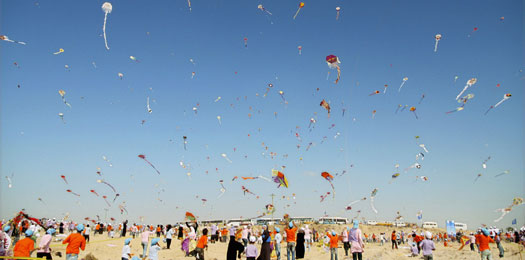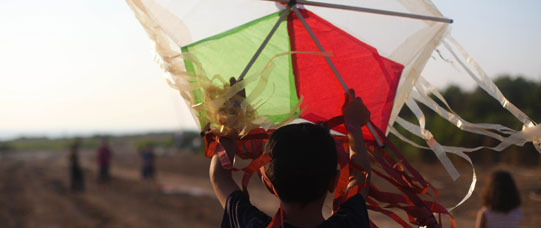By Aurora Tellenbach
There are two important factors in making a kite, the young expert Musa explains: precision and balancing the strings carefully. Surrounded by other children in Seifa on the Gaza Strip he demonstrates his skills as they are soon to participate in an attempt to break the Guinness World Record of kite flying.

Living close to the Israeli border the children are aware of the danger of getting too close to the barbed wire. Musa’s grandfather is concerned as a majority of the population are children aged 16 and under and; they are already accustomed to the presence of Israeli tanks and the arrest of family members. But for now the children are happily looking forward to the Kite Festival. To demonstrate his kiting prowess Musa and his sister Widad glue newspapers to the sticks to make a prototype. For Widad the kite represents freedom and the only chance of leaving their imprisoned life on the Gaza Strip.

In Jabalya, the biggest refugee camp in Gaza, Abeer tells us her dream is to become a journalist and to communicate the Gazan people’s voices to the rest of the world. She lives in a buzzing urban landscape marked by the ravages of war: pockmarked buildings and piles of rubble. Abeer is participating in the Kite Festival as a junior reporter. Flying Paper is co-produced with young Palestinians trained by the filmmakers through the youth media programme Voices Beyond Walls. Even in the narrow streets of the camp, children are flying kites, rescuing them when they get stuck in construction wires by climbing the buildings.
Flying Paper is interlaced with animated stories including a kite flying past barbed wire, Israeli surveillance, escaping a dragon attempting to pull a kite into the sea and reaching the freedom that the children are hoping for. Together with the children’s stories of wars and arrests, ruined farm land, the poverty, as well as their knowledge about missiles gained far too early in life, the kites are a contradiction seen through their purpose of pleasure. With material provided for by UNWRA they can create kites to their own liking.
In solidarity with the children of Gaza some kites have been donated, one is embroidered by a Palestinian refugee in Jordan, another made by an Iraqi refugee. A group of girls wearing t-shirts with the UNRWA logo show Abeer the statements they have written on their kites: a right to pride, education, justice, equality and life.
The film emphasises the positive experience of working on a project enabled through the UN Summer Games. By taking responsibilities for their kite projects the children are also given the opportunity to raise awareness about their living conditions as the world gets to know about their world record attempt. It also shows the creativity of the children in designing their kites and in problem solving. A few days before the Kite Festival, Musa starts developing an idea of filming their record attempt from the air by tying a small camera to his kite. Approaching the task and with the help of his grandfather, he designs a new kite, and indeed, it does produce aerial views of the extent of the participation in the Kite Festival.
When the day for the Kite Festival arrives, 7,500 children are transported in buses to the beach with their kites. To see the children participate in the Kite Festival is a truly joyful moment.
Through the young interviewees you get the dreams and hopes of a future life in freedom. Although the children are affected by constantly living with the fear of violence, their creative approach to the record attempt gives the film a very positive and warm feeling. Learning to achieve a goal by developing strategies and working together, the kites symbolise an achievement for bigger purposes.
Flying Paper will be screening as part of the 2013 London Palestine Film Festival at the Barbican Centre on Tuesday 7 May 2013 at 8.15pm. It will be introduced by Executive Producer Uzma Hassan. Click here for more information.
Aurora Tellenbach is an arts project manager mainly working on stage productions with cross-cultural themes. Formerly a broadcast journalist, Aurora is now in the process of completing a PhD on Mapping Migration in Contemporary Arab Cinema (2000-2010). She has lectured on the same subject to postgraduate Film Studies students and has conducted extensive fieldwork in North Africa and the Levant.
